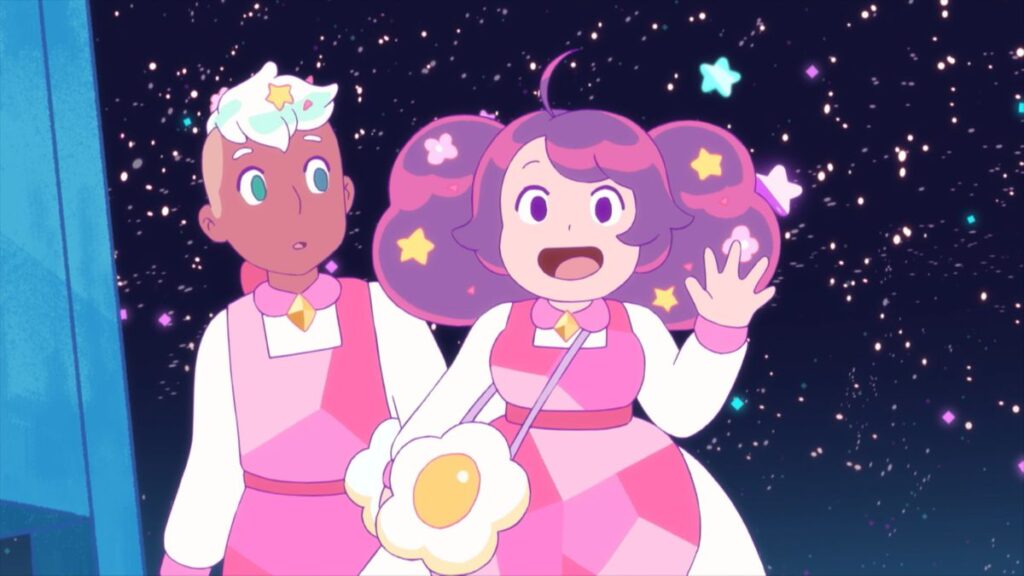The wait for the second season of Natasha Allegri’s Bee and PuppyCat has been an awfully long one, marked by delays, leaks, and uncertainty about when — not to mention where — the series might eventually end up. Netflix’s new Bee and PuppyCat: Lazy in Space might throw longtime fans of the original show for a bit of a loop at first. Once it works through the curious bit of narrative deja vu that shapes its first few episodes, though, Lazy in Space manages to become what every long-awaited follow-up to a beloved series wants to be: phenomenal and moving in its own right.
Much like the original Bee and PuppyCat web series that debuted on Frederator’s Cartoon Hangover YouTube channel in 2013, Lazy in Space tells the story of Bee (Allyn Rachel), an easygoing 20-something with a heart that’s as big as her rent is overdue. None of the other young adults living in the sleepy, impossibly chill island city Bee calls home would consider themselves as “having it together.” But Bee can’t help but feel as if she isn’t living up to her full potential because she struggles to hold down a job, even when her good friends like aspiring chef Deckard (Kent Osborne) go out of their way to help her keep one.
Bee’s been fired from so many of her temp agency gigs that she barely bats an eye when she receives her latest pink slip in Bee and PuppyCat: Lazy in Space’s first episode. But everything about Bee’s pleasantly humdrum life takes a sudden and magical turn after she offhandedly makes a wish for another living creature to take care of, and the universe responds by dropping an adorable, ornery creature into her lap.
Early on, Lazy in Space is peppered with few details alluding to just how whimsical its reality is, but it isn’t until PuppyCat — a chubby cat-dog hybrid “voiced” by vocaloid OLIVER — beams down from a rift in space and becomes Bee’s pet that the series starts to come into focus. Along with not knowing how she’s going to pay her bills and feed a mutant animal, Bee doesn’t really know why she can understand PuppyCat’s high-pitched, computerized screeching as speech when nobody else can. But when PuppyCat tells his new owner that he’s thought of a way for them to make some quick, easy cash, Bee doesn’t think twice before saying yes, partially because they need the money but mostly because she can’t resist the call of a good, strange adventure.
As timely as a cartoon about a disaffected gig-working magical girl and her slick-mouthed animal companion felt back when Bee and PuppyCat debuted in 2013, its premise resonates even more now, which is likely why Lazy in Space spends so much time rehashing it. Though the bulk of Lazy in Space’s story is new, its first three episodes are a simultaneously condensed and expanded do-over of the original series as a whole lot more than a proper continuation of its story.
While a number of Lazy in Space’s jokes are shot for shot remakes from the web series, the show takes its time as it makes them over the course of each of its 30-minute-long episodes. Because Lazy in Space’s episodes are so much longer, though, the show’s able to incorporate much more intrigue into its story and foreshadow its Steven Universe-like twists with a newfound level of confidence and comfortability that works to its advantage.
Image: Netflix
Despite the aggressively moé, wholesome aesthetics that make it seem like a kids’ show, Bee and PuppyCat: Lazy in Space often feels like it exists somewhere between more mature series like Infinity Train and (surprisingly) Broad City as it digs into what makes its heroes and villains tick. Supporting characters like Cardamon (Alexander James Rodriguez), a little prince who’s also Bee’s landlord, and Toast (Terri Hawkes), a wrestler with dreams of greatness, show up initially to provide comic relief and foreshadow pieces of the mystery Lazy in Space revolves around. But with each of their arrivals, Lazy in Space becomes that much more explicit about how it’s truly a story about people like Bee learning how to take care of themselves as passionately as they do others.
Even if Bee and PuppyCat: Lazy in Space doesn’t strike you as the type of show capable of sucking you in, its lessons about the importance of prioritizing emotional fulfillment before work are valuable ones worth spending time on. But they’re just one of the many things you’re likely to love about the cartoon if and when you give it a shot.
Bee and PuppyCat: Lazy in Space is now streaming on Netflix.

